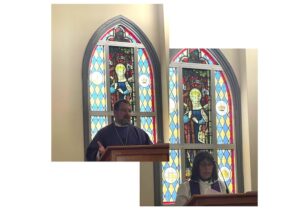The Very Reverend Dr Richard Fermer, Dean of St Christopher’s Anglican Cathedral in Manama, Bahrain, writes:
While Bahrain Formula 1 blazed in style, to the entertainment of travellers from all around the world, it may have escaped people’s attention that Holy Week began for Christians this Sunday, which also tragically saw horrendous violence in both Ukraine and Gaza, targeting civilians and civilian infrastructure.
In Ukraine, the massacre happened in broad daylight while people were going to church on Palm Sunday – the deadliest attack of the conflict this year for civilians. Two children were among the 34 people killed, while 117 people were wounded, by two Russian ballistic missiles – one hit a university building and another exploded over a residential street. In Gaza early on Sunday morning, an Israeli air-strike hit the genetic laboratory, the pharmacy, the emergency department and reception area, with collateral damage to the church of the Anglican-run “Al Ahli Hospital”. Doctors, staff and patients were given 20 minutes notice to evacuate. A statement from the Anglican Diocese of Jerusalem said that “[we are] appalled at the bombing of the hospital, now for the fifth time since the beginning of the war in 2023 – and this time, on the morning of Palm Sunday and the beginning of Holy Week. We call upon all governments and people of goodwill to intervene to stop all kinds of attacks on medical and humanitarian institutions. We pray and call for the end of this horrific war and the suffering of so many.” The Israel Defence Forces (IDF) said that they had struck “a command-and-control centre used by Hamas”, however, they have not yet offered proof, nor are they allowing international verification – a pattern they have followed throughout the conflict. This is from an Israeli regime, which is also denying Al Ahli Hospital medical supplies and equipment, according to the World Health Organisation, the same for all hospitals in Gaza, “which is obstructing WHO’s ability to resupply them and preventing patients from safely receiving life-saving care.”
For Christians, Holy Week begins with the liturgical reenactment of the entrance of Jesus into Jerusalem in a procession of palms. According to Luke’s Gospel, Jesus enters Jerusalem not as one may expect a “King” to do so. He enters on a colt, that is a young donkey, undersized for an adult man. It must have made for an almost comic spectacle, were it not for its powerful resonance with the prophecy of Zechariah (9.9-10):
“Lo, your king comes to you;
triumphant and victorious is he,
humble and riding on a donkey,
on a colt, the foal of a donkey.
He will cut off the chariot from Ephraim
and the warhorse from Jerusalem;
and the battle-bow shall be cut off,
and he shall command peace to the nations.”
Jesus’ Way does not claim worldly or military power, but chooses the way of lowliness and humility. He deconstructs human vanity and the corruption of power, and brings God’s peace – not an ephemeral peace based on bullying of the weak by the powerful, which is ultimately, as Shakespeare describes, “a tale//Told by an idiot, full of sound and fury// Signifying nothing”. There is no triumphalism at all. Jesus as he enters Jerusalem, weeps for the city: “‘If you, even you, had only recognized on this day the things that make for peace! But now they are hidden from your eyes”(Luke 19.42). How poignant are those words not just then, but now. How important it is for all of us to seek to recognise “the things that make for peace”.
By dying on the Cross, Jesus not only shows solidarity with human suffering, the innocent victims of these latest attacks, but also addresses the cause of such violence in the human heart. All human sin is by definition introverted. It fails to recognise the “other”, whether it be God or one’s fellow humanity or creation itself, which is why harm can be meted out without the control of one’s conscience.
Not so for Jesus. There is humility, there is descent, in giving oneself “for others”, “in the place of others”, opening up new life, which is filled with joy, goodness, mercy and peace forever.
As Christians walk the way of the Cross this week, let us be attentive to the sorrow of others, and our own moral and spiritual numbness, as we ask ourselves, the constant refrain of the Book of Lamentations (1.12) that is woven into the liturgy of Holy Week: “Is it nothing to you, all you who pass by? Look and see…”




